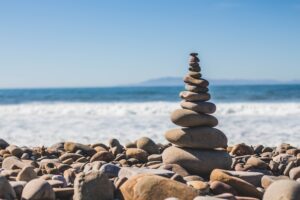Art of Relaxation: Stress Management Techniques
Art of Relaxation: Stress Management Techniques
By Marshall Krupp, Certified EOS Implementer
In collaboration with Ashley Berecz, Client Relations Manager
Stress is a common problem in today’s fast-paced world. It affects our mental and physical health and can lead to chronic health issues if left unchecked. That’s why stress management is crucial for leading a happy and healthy life. In this blog, we’ll introduce you to the art of relaxation, one of the most effective stress management techniques.
What is Relaxation?
Relaxation is the state of being free from tension and stress. When you relax, your body and mind slow down and become calm. Relaxation techniques help you to achieve this state and reduce stress levels.
Benefits of Relaxation for Stress Management
Relaxation techniques are effective in reducing stress because they help to calm the mind and body. When you relax, your heart rate slows down, your breathing becomes slower and more regular, and your muscles relax. This leads to a reduction in stress hormones, such as cortisol, and an increase in endorphins, which are the feel-good hormones.
Different Types of Relaxation Techniques
There are several relaxation techniques to choose from, and you can try different techniques to find what works best for you. Some popular techniques include:
- Deep breathing exercises: Deep breathing exercises are a simple and effective way to relax. You can do deep breathing exercises anywhere and at any time, making them a convenient stress management technique.
- Progressive muscle relaxation: Progressive muscle relaxation involves tensing and then relaxing each muscle group in your body. This helps to release tension and stress from your muscles.
- Meditation and mindfulness: Meditation and mindfulness are powerful stress management techniques. They help you to focus on the present moment and become more aware of your thoughts and feelings.
- Visualization and guided imagery: Visualization and guided imagery involve creating a mental image of a relaxing scene. This can help to reduce stress and improve your overall mood.
- Yoga and stretching: Yoga and stretching are excellent for reducing stress and improving flexibility. They help to calm the mind and relax the body.
- Massage and aromatherapy: Massage and aromatherapy are also effective stress management techniques. Massage helps to release tension from the muscles, while aromatherapy uses essential oils to create a relaxing and soothing environment.
Implementing Relaxation into Your Life
Relaxation techniques are simple and easy to incorporate into your daily routine. Here are some tips for making relaxation a habit:
- Set aside time each day for relaxation: Choose a time each day that works best for you, such as before bed or in the morning, and set aside time for relaxation.
- Create a relaxing environment: Make your relaxation space comfortable and calming, with soft lighting and soothing sounds.
- Try different techniques: Experiment with different relaxation techniques to find what works best for you.
- Make relaxation a priority: Don’t let other responsibilities take priority over your stress management routine. Set aside time for relaxation and stick to it.

Common Challenges
One of the biggest challenges of incorporating relaxation into your life is making it a habit. Here are some tips for overcoming this challenge:
- Start small: If you’re new to relaxation techniques, start with just a few minutes a day and gradually increase the time as you become more comfortable.
- Find a partner: Find a friend or family member who is also interested in stress management and do relaxation exercises together.
- Make it a part of your daily routine: Incorporate relaxation into your daily routine, such as after your morning shower or before bed.
In conclusion, the art of relaxation is a simple and effective stress management technique that can have a positive impact on your mental and physical health. By incorporating relaxation techniques into your daily routine, you can reduce stress levels, improve your mood, and lead a happier and healthier life. Whether it’s deep breathing exercises, meditation and mindfulness, yoga and stretching, or massage and aromatherapy, there is a relaxation technique that is perfect for everyone. So take some time for yourself, relax, and enjoy the many benefits that come with the art of relaxation.
If you have any questions or would like to continue this discussion further, please contact us at ashley.berecz@peerexecutiveboards.com or go to our website at www.peerexecutiveboards.com and contact us virtually. We will be happy to get back to you!
_ _ _ _ _ _ _ _ _ _ _ _ _ _ _
EOS®, the Entrepreneurial Operating System® takes entrepreneur businesses on a journey of mastery of the EOS tools which enables businesses to elevate their leadership teams to make better decisions, maintain a level of accountability, at attain greater success more simplistically. The components of EOS® are Vision, People, Data, Issues, Process, and Traction, which when used effectively attains a healthier organization with greater success. Marshall Krupp is a recognized Certified EOS® Implementer serving clients through the nation. He is also a national speaker, a past award-winning Vistage Worldwide Chair, and a past career of providing crisis management strategic advisors service to businesses, governmental agencies and not-for-profit organizations. Review more at www.peerexecutiveboards.com and at www.eosworldwide.com/marshall-krupp.


0 Comments